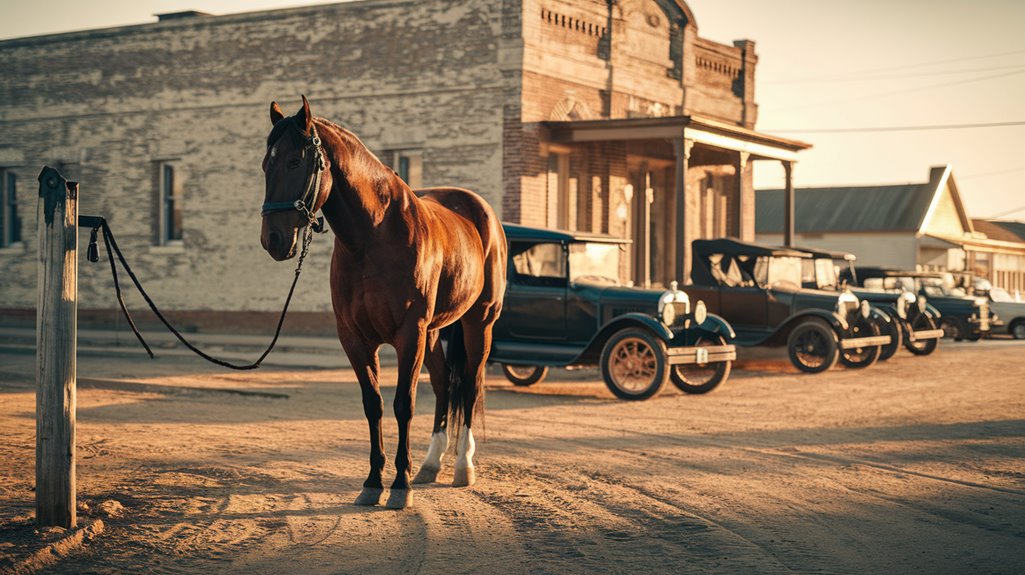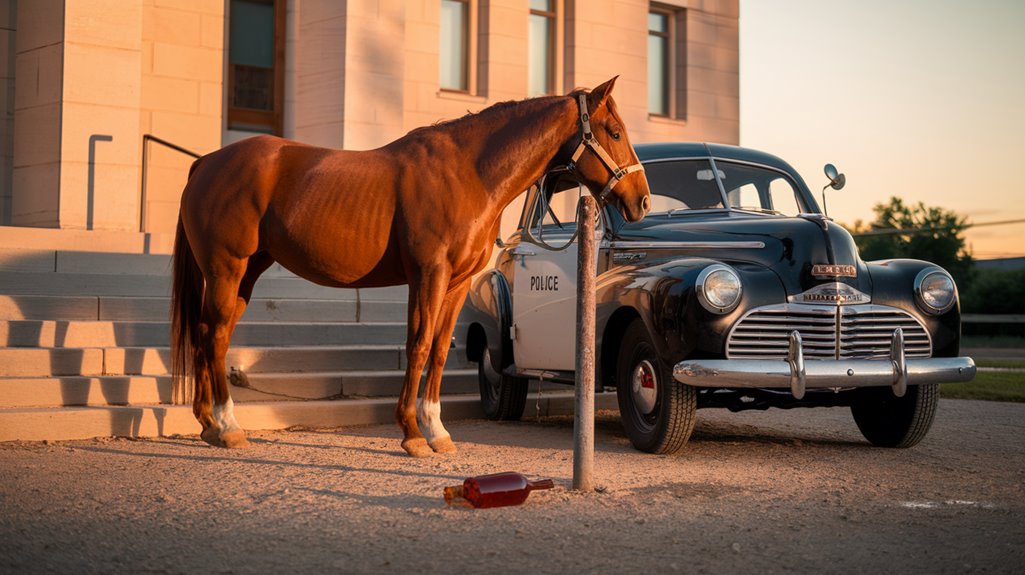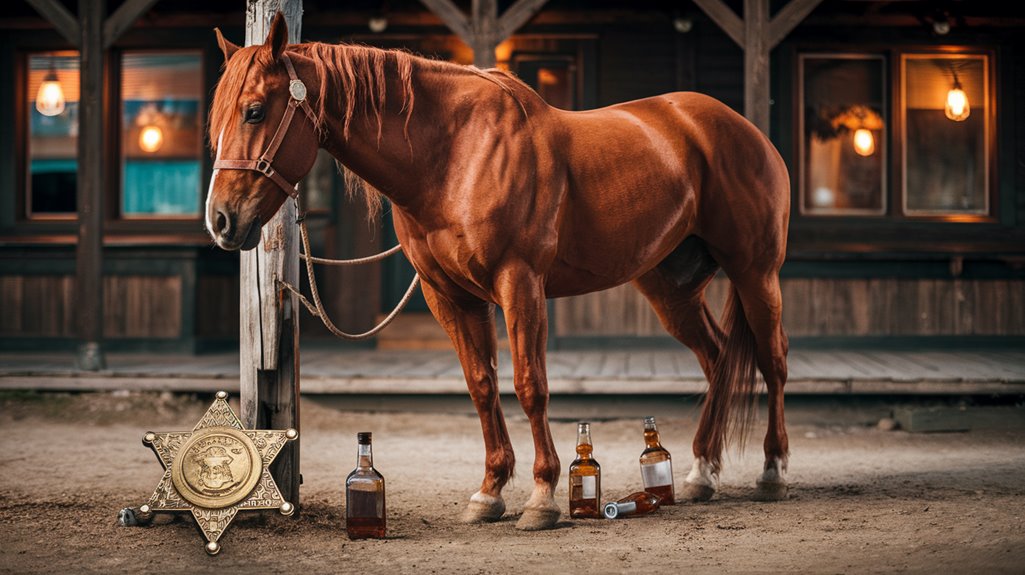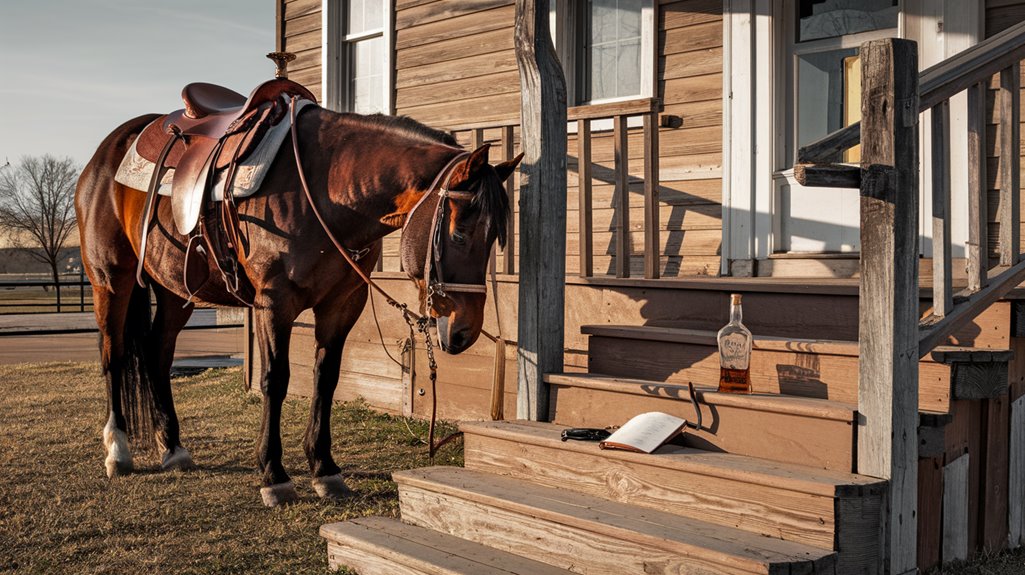Yes, You Can Get a DUI on a Horse
You might assume that mounting a horse after a few drinks is safer than getting behind the wheel, but several states will charge you with a DUI for riding while intoxicated. Whether you're trotting down a country road or galloping through town, your trusty steed is legally considered a vehicle in places like California, Florida, and North Carolina. Before you saddle up after happy hour, you'll want to understand the surprising legal consequences and where these laws apply.
The Legal Definition: When Is a Horse a "Vehicle"?

While most people associate DUI charges with cars and motorcycles, the legal definition of a "vehicle" varies considerably across jurisdictions when it comes to horseback riding. Six states including California and Florida specifically define horses as vehicles in their DUI statutes.
You'll find significant jurisdictional variances in how states classify horses under their vehicle laws. For example, North Carolina's broad definition allows for DUI charges when riding horses, while Utah and Arizona explicitly exclude them from vehicle classifications. Operating with a BAC over .05 in Utah is illegal when driving traditional vehicles.
The horse classification debate has led to notable court decisions. North Carolina's courts have upheld DUI convictions for intoxicated riders, as seen in State v. Dellinger.
However, Utah's Supreme Court ruled that horses aren't "devices" and consequently can't be vehicles.
Even if your state doesn't consider horses vehicles, you can still face other charges like public intoxication or animal cruelty for riding while impaired.
States That Consider Horse Riding a DUI Offense
Although riding a horse might seem far removed from operating a motor vehicle, several states explicitly classify drunk horseback riding as a DUI offense.
In North Carolina, the State vs. Dellinger case established that intoxicated horseback riding falls under DUI laws, while Kansas and Oregon have specific equestrian laws addressing this issue directly. The possibility of public intoxication charges exists even in states where DUI laws don't apply to horses.
State variations show that California, Kentucky, and Georgia treat horseback riders similarly to motor vehicle operators. Under California's Vehicle Code 21050, you'll face the same DUI consequences whether you're behind the wheel or in the saddle. Riders must maintain a blood alcohol concentration below 0.08% to avoid legal trouble.
Michigan and Florida have also prosecuted cases where intoxicated riders faced DUI charges. If you're planning to ride in any of these states, you'll need to follow the same sobriety rules that apply to driving a car.
Penalties and Consequences of Equestrian DUIs
Riders caught operating a horse while intoxicated face serious legal consequences across jurisdictions that enforce equestrian DUIs.
You could face fines ranging from $5,000 for first offenses up to $10,000 for repeat violations, along with potential criminal charges for reckless endangerment and animal cruelty.
The financial implications extend beyond fines, including increased insurance premiums and legal fees from civil lawsuits if accidents occur.
Since 1906, when New Jersey first enacted DUI laws, legislation has evolved to include various forms of transportation.
You'll also encounter significant social repercussions, as a DUI conviction can damage your reputation and affect future employment opportunities.
The mark on your record might restrict your ability to travel internationally or maintain horse ownership privileges.
Additionally, you could face citations for traffic violations, making this seemingly old-fashioned offense carry thoroughly modern consequences.
Law enforcement officers often rely on field sobriety tests and careful observation of rider behavior to determine impairment levels.
Public Roads vs. Private Property: Where Laws Apply
Understanding where DUI laws apply to horseback riding depends largely on whether you're on public roads or private property.
When you're riding on public roads, you'll face strict riding regulations in states that classify horses as vehicles. Kentucky state law explicitly includes horses as vehicles under DUI laws. Public intoxication and DUI charges are more likely if you're caught drunk on horseback on highways or public thoroughfares. These regulations may need to be updated regularly as circumstances and legislation evolve over time.
On private property, you generally won't face DUI charges for riding while intoxicated, though other laws might still apply, especially regarding animal welfare.
- If you're on public roads in states like California, Texas, or Florida, you can be charged with a DUI while horseback riding.
- Private property riding typically falls outside DUI jurisdiction, but animal cruelty laws still apply.
- Your location determines which laws affect you – public roads face stricter enforcement than private lands.
Alternative Charges Beyond DUI for Intoxicated Riders

While DUI charges may not always stick for intoxicated horseback riding, law enforcement can pursue several other criminal charges against riders who've had too much to drink.
Under California Vehicle Code §21050, riders must follow the same rules as drivers since horses are classified as vehicles on highways.
You could face reckless endangerment charges for putting yourself, your horse, and the public at risk. If your impaired state leads to mistreatment of your horse, you might also be charged with animal cruelty. In a notable Florida case, a woman riding horseback while drunk faced animal neglect charges alongside her DUI citation.
You're not off the hook even if you avoid these serious charges. Police can still cite you for public intoxication, disorderly conduct, or causing a public disturbance.
If you're carrying open alcohol containers or drinking in public spaces while riding, you'll face additional penalties. For riders under 21, combining alcohol with horseback riding breaks multiple laws and compounds potential consequences.
Safety Tips for Responsible Horse Riding
Safety around horses demands consistent awareness and proper technique, whether you're a novice or experienced rider. Following proper equine etiquette, you'll want to approach horses from the side and avoid sudden movements or loud noises that could startle them. It's recommended to have the owner ride first to evaluate the horse's temperament and behavior.
Riding safety starts with wearing proper equipment, including an approved helmet, safety stirrups, and riding gloves. All helmets should meet PAS 015 standards for maximum protection.
- Always maintain a safe distance from other horses when riding in groups, and clearly communicate any hazards you spot.
- Never wrap lead ropes or reins around your hands, as this could result in serious injury.
- Get familiar with a new horse before riding, including understanding their typical behavior and environment.
These fundamental practices help guarantee both you and your horse stay safe while maintaining control during your ride.











